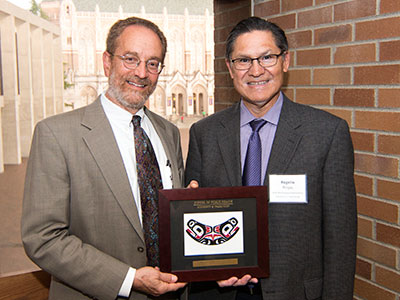More than four decades ago, during the civil rights movement and protests against the Vietnam War, Rogelio Riojas and fellow student activists peacefully took over University of Washington administration building, including the president’s office. Today, Riojas sits on the UW Board of Regents, the body that governs the university.

“I learned that social change does not happen by being passive or expecting others to create change,” Riojas told about 200 people – including some of this generation’s student activists – at Kane Hall April 27.
Riojas was honored for his years of service, humanitarianism and achievement in public health – as well as his fight against racial discrimination – while giving the UW School of Public Health’s annual Distinguished Alumni Award lecture.
“Social justice and public health are intertwined,” said Riojas, the son of migrant farmworkers and the university’s first Latino regent. “You can’t have one without the other.”
As president and CEO of Sea Mar Community Health Centers, which was founded in 1978, Riojas has fought to improve access to affordable health care, better housing and higher education, especially for the poor and Latinos.
The agency began with a modest $200,000 federal grant and eight employees in the South Park neighborhood of Seattle. Today it has 91 sites and serves 240,000 patients a year, generating more than $200 million in revenue.
Community health centers grew out of the civil rights movement, Riojas noted, and were designed to bring quality care to people in need regardless of their race, income, culture or health status. These days, Sea Mar clinics help sign up people for insurance under the Affordable Care Act and train doctors in family medicine.
“The current health care system in this country is not sustainable and changes need to be made,” Riojas said. He noted the industry is moving away from fee-for-service based reimbursement to value-based care. “This method of delivering care is not new to community health centers, since we have been delivering health care in a comprehensive way for many years,” he said.
Riojas planned to be a lawyer to fight for change. But during his junior year at the UW, he lobbied for the establishment a community health clinic in his hometown of Othello, WA, and that changed his mind.
“We looked for a Latino health care administrator to run the clinic, but we couldn’t find one,” Riojas said. “Then, we looked for any health administrator who wanted to move to a rural area, but we couldn’t find one, either. That’s when I decided I could best help my community by becoming a health administrator and I changed my career goal.”
Riojas earned his MHA in 1977 from the UW after earning bachelor’s degrees in political science and economics. “My University of Washington education – the master’s degree in health administration and the political science degree – has helped shape my social views and priorities into concepts that have helped me become a strong community organizer and be an advocate for social change,” Riojas said.
The School of Public Health, in particular, teaches students to gain a better understanding of social economic status, class, race and social determinants of health, he said. “These underlying themes helped change my perspective on how health and social justice work together,” Riojas said.
During his speech, about a dozen students held up signs calling for more diversity, more funding for mental health and for divesting from private prisons.
“That’s exactly what they should be doing,” Riojas said. “They need to push us, and the community needs to be pushing them so we can make change.”
Two students took the microphone during the end of a Q and A session moderated by former King County Executive Ron Sims. One, Palca Shibale, urged Riojas to support divestment from private prisons, saying that prisons disproportionately house people of color.
